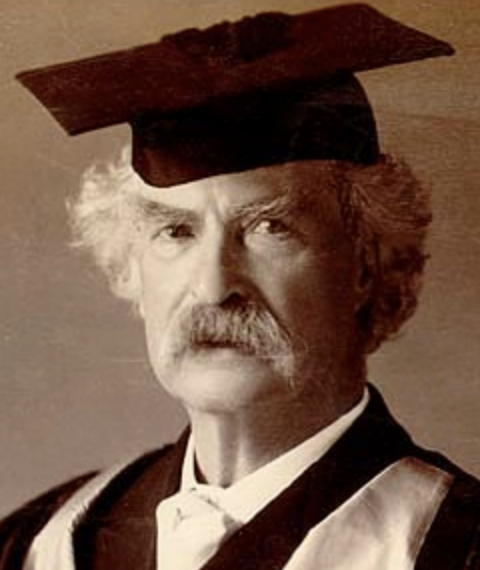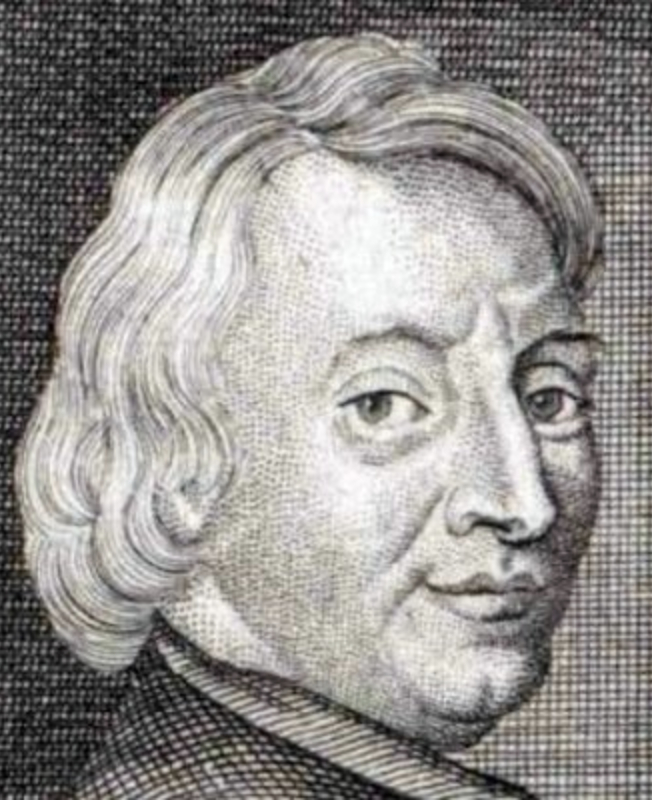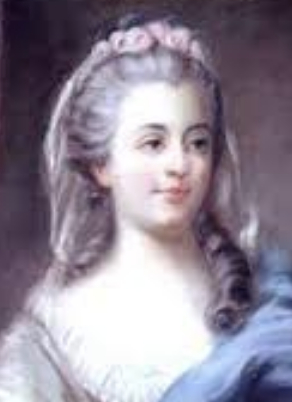November 30
Mark Twain

On this date in 1835, America’s iconographic humorist and writer Mark Twain (né Samuel Langhorne Clemens) was born in Florida, Mo. He grew up in Hannibal, which became the inspiration for the setting of his classic books Tom Sawyer and The Adventures of Huckleberry Finn. His mother, Jane Lampton Clemens, was an advocate of the downtrodden and “could be beguiled into saying a soft word for the devil himself,” he recalled. His father died when he was 11. Samuel left school to work and by 13 was a journeyman printer at the Hannibal Gazette.
Traveling east to work as a printer and writer, he returned to Missouri to spend two eventful years as a cub pilot on the Mississippi River. His nom de plume was inspired by the call “mark twain” made to signal a safe passage of two fathoms’ depth. Twain worked as a reporter in Nevada and California. When his story “The Celebrated Jumping Frog of Calaveras County” was published, he became a national celebrity. He worked as a traveling correspondent and lecturer. Innocents Abroad was published in 1869.
After marrying Olivia Langdon in 1870, he built an opulent house in Hartford, Conn. It was at this home and at his sister-in-law’s farm in Elmira, N.Y., where he produced Tom Sawyer, The Prince and the Pauper, Life on the Mississippi and Huck Finn (1884). Twain’s later works included A Connecticut Yankee in King Arthur’s Court (1889), “The War Prayer” (a scathing indictment of war and religious hypocrisy, written in 1905 but not published until 1923), The Mysterious Stranger (debunking Providence and published posthumously in 1916) and Letters From the Earth. His daughter Clara delayed publication of this blasphemous yarn told about humans from Satan’s perspective until 1962.
Europe and Elsewhere, containing “The War Prayer” and other freethinking writings, was edited by Albert Bigelow Paine, who also helped edit Twain’s autobiography published in 1923. Pudd’nhead Wilson (1894) begins each chapter with an aphorism from “Pudd’nhead Wilson’s Calendar,” including “There is no humor in heaven.” In Following the Equator (1897), he famously said, “Faith is believing what you know ain’t so.” Twain’s sardonic humor increasingly added indignant social criticism. He called the Book of Mormon “chloroform in print.” In 1907, he wrote Christian Science, exposing Mary Baker Eddy’s “desert vacancy, as regards thought.”
In the late 1890s he became a passionate critic of American imperialism, opposing the Spanish-American and Philippine wars. Twain suffered many personal tragedies, from his brother Henry’s tragic death in a steamboat accident in 1858, the death of his son Langdon at 19 months, the death of his daughter Susie from meningitis at age 24 and the death of his daughter Jean in an institution during an epileptic seizure. His wife Livy died in 1904. (D. 1910)
PHOTO: Twain in 1907 receiving a doctor of letters degree from Oxford University.
"I cannot see how a man of any large degree of humorous perception can ever be religious — except he purposely shut the eyes of his mind & keep them shut by force."— "Mark Twain's Notebooks and Journals, Notebook 27, August 1887-July 1888," ed. Frederick Anderson (1979)
John Toland

On this date in 1670, John Toland was born in Ireland, where he was rumored to be the son of a Catholic priest. He was “Educated from the cradle in the grossest superstition and idolatry,” he later wrote in Apology (1697). By age 15 he had rejected Catholicism by “his own reason.” He studied at Glasgow College from 1687-90, aligning himself with Presbyterianism and earning a master’s degree. He then studied at Leyden, Holland.
The Encyclopedia of Unbelief terms Toland “perhaps the first professional freethinker.” He directed the bulk of his writing, more than 100 works, against established religion while shrewdly qualifying his statements to avoid prosecution. Toland was perhaps the first to be called a “freethinker” (by Bishop Berkeley). At Oxford, Toland wrote the deistic Christianity not Mysterious (1696), in which he credited “cunning priests” with the promotion of irrationality. He returned to Ireland for a visit, where his book was castigated from the pulpits and by the Irish House of Commons, which ordered the book burnt and the author arrested.
One member of the House even moved “that Mr. Toland himself should be burnt.” By 1704, Toland, who had translated the work of Giordano Bruno, called himself “a Pantheist” and is believed to be the first to use the term, defining it as the belief that only the material universe and nature are divine. In History of the Soul’s Immortality, Toland asserted that this doctrine was a self-serving invention by Egyptian priests. He also wrote Life of Milton (1698) and political tracts. His pamphlet “Nazarenus” (1718) contained early samples of biblical criticism. His Pantheisticon (1720) rejected supernaturalism. His essay “Tetradymas” contains bible criticism and a description of the murder of Hypatia. (D. 1722)
“Virtue alone is enough to live happily and brings its own reward.”
— Toland, "Pantheisticon" (1720)
Louise-Victorine Ackermann

On this date in 1813, Louise-Victorine Ackermann (née Choquet) was born in Paris. Her atheist father educated her in the philosophy of the Encyclopédistes. While studying German in Berlin, she met Paul Ackermann, a German pastor who had lost his faith, and married him in 1843. They had two happy years before his death. She moved to Nice and wrote highly regarded stories and poems, Contes (1855) and Contes et Poesies (1863). Her home in Paris became a hub for major writers.
“She was the most decidedly Agnostic of them all,” wrote freethought historian Joseph McCabe. Other scholars think she was closer to being an atheist, judging from her verse. Ackermann is best-known for Poesies (1874), which contains powerful, somber verses about human suffering. She also wrote Pensees d’un solitaire (1883), which included a short autobiography. (D. 1890)
“The element of religions is ignorance. Faith disappears before science. A humanity that is superior to us would no longer need to believe; she would know.”
— Ackermann, "Pensées d'un solitaire" ("Thoughts of a Recluse," 1883)
Gael García Bernal

On this date in 1978, actor Gael García Bernal was born in Guadalajara, Mexico. He became the first Mexican accepted into London’s prestigious Central School of Speech and Drama, where he studied drama. He appeared as a teen in telenovelas (soap operas) and has appeared in many films, including “Amores perros” (2000), “Y tu mama tambien” (2001), “El Crimen del padre Amaro” (2002), “The Motorcycle Diaries” (2004), “Bad Education” (2004), “Babel” (2006), “Even the Rain” (2010), “Casa de Mi Padre” (2011) and “No” (2012).
García Bernal was nominated for a BAFTA Best Actor Award for “The Motorcycle Diaries” and “No” received a nomination for Best Foreign Film at the Oscars. He continued to land acting, directing and voice roles in the mid- to late-2010s. He won a 2016 Golden Globe for Best Actor — Television Series Musical Or Comedy for “Mozart in the Jungle,” Amazon Studios’ web TV series. Time magazine in 2016 named him a Most Influential person.
In the movie “El Crimen del padre Amaro,” García Bernal plays a young priest who forms a relationship with a teen girl whom he impregnates. He pressures her to get an abortion and the unregulated procedure kills her. The Catholic Church attempted to stop its release in Mexico.
He married Argentinean actress Dolores Fonzi in 2009. They have two children, Lazaro and Libertad.
“I am … culturally Catholic, but spiritually agnostic.”
“Yo soy … culturalmente Católico, pero espiritualmente agnóstico.”— García Bernal, interview with El Universal newspaper, Mexico City (Feb. 2, 2003)
